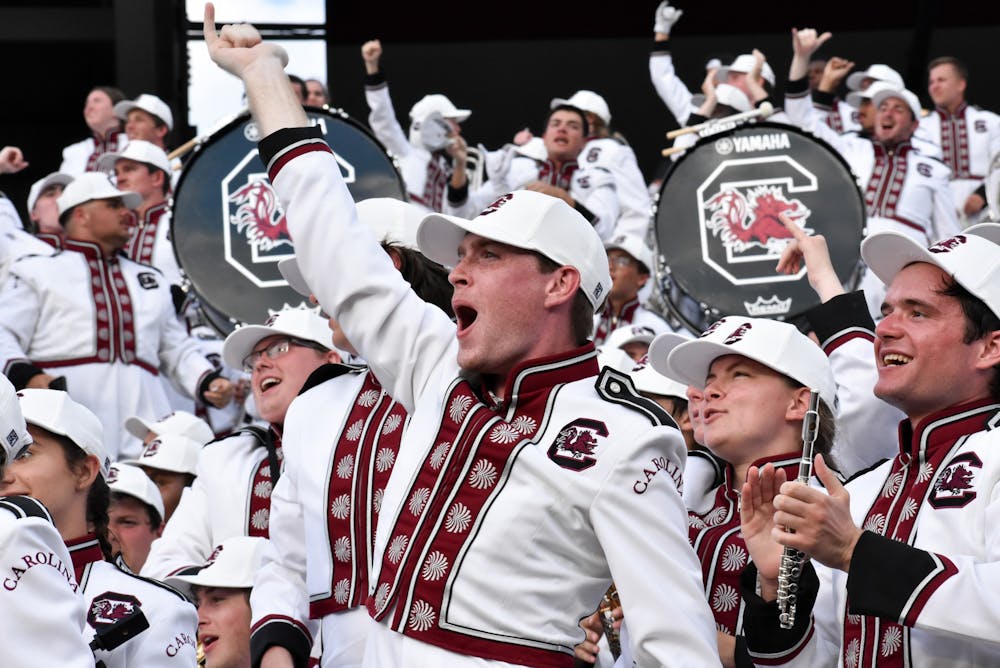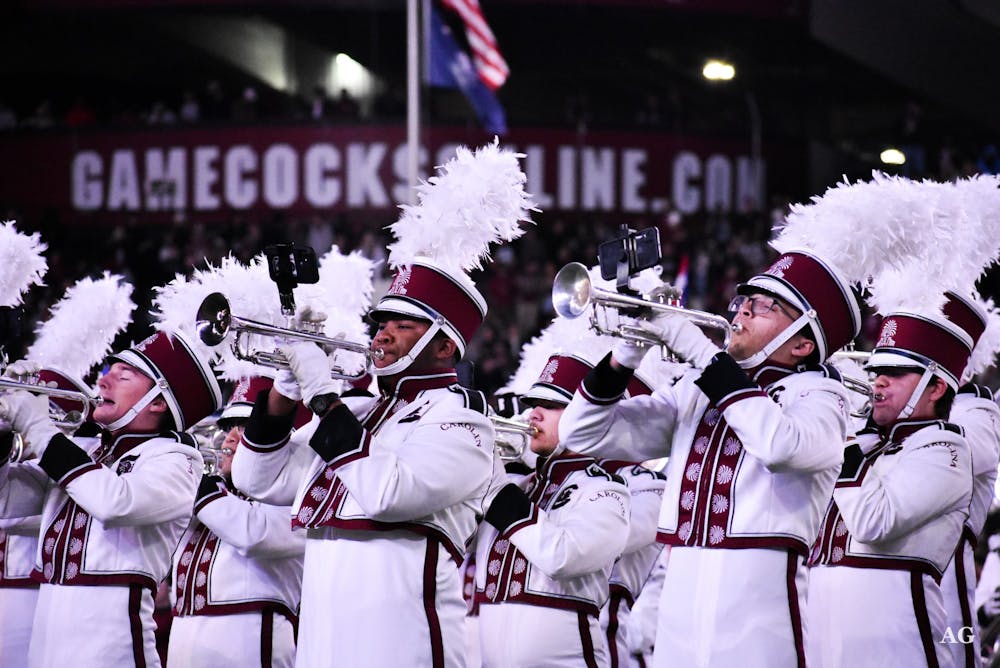“It’s Saturday in South Carolina!”
So many Gamecock football fans are familiar with this iconic line, and when it sounds throughout Williams-Brice Stadium minutes before kickoff, thunderous applause follows. Football season is without a doubt one of the most widely anticipated aspects of being a Gamecock, and for a group of roughly 360 students, the fall semester brings with it a football season experience all its own.

For over a century, the Carolina Band has entertained crowds of football and music fans alike, and band pride runs deep across multiple generations. While students come from different backgrounds, they all embrace a shared identity as a member of the Mighty Sound of the Southeast. Members will attest that being a part of the Carolina Band is a fun and rewarding activity, but for others, becoming a band member is far more than that - it was a childhood dream.
Lauren Cunningham, a member of the color guard, was eight years old when her father brought home a CD recording of the Carolina Band. She immediately fell in love and from that moment on Cunningham knew that she would someday perform with the band. While her road to graduation has been a rocky one as a result of the COVID-19 pandemic and other unforeseen complications, Cunningham’s years with the band came with no lack of incredible memories and lifelong relationships unique to the college band experience.
Many members of the band have noted over the years how little of an understanding the general USC student body seems to have of their day-to-day, and Cunningham notes that these departures from the typical student experience begin even before the first day of classes. “The college experience for people in the band doesn’t start the way it does for most other people,” she said. Band members move in several days before most students, and from the first day, band camp is underway. Players, guard members, drum majors and directors alike dedicate twelve-hour days in the midsummer sun preparing for the following football, or rather, marching band season. By the time of the first football game, the band has put in weeks of work in order to prepare the music for pep rallies, stand tunes and two field shows—one for pregame and one for halftime.
“Tuesday through Friday, the whole band comes together from 5 to 6:30 and rehearses," Cunningham said, "And depending on the football schedule and whether we have a game that week, we might start learning a show Tuesday to perform on Saturday. That’s the drill, the choreography and the music.” It’s evident that the caliber of hard work needed for band camp does not decrease at any point during the fall semester. “That’s one of those things I don’t think a lot of students know and understand about the band is how much information we have to comprehend and then translate onto the field in a short amount of time.”

Leah Weeks, a freshman clarinet player, came to Carolina from an outstanding high school band program with hopes to continue in the activity that had defined the past four years of her life. While joining any new program can be intimidating, the renown of the Carolina Band can be especially daunting to some freshmen. However, Weeks recalls how the inclusive culture of the program made for a seamless and exciting transition into college. “The music is always super fun, the staff is inviting and the people are inviting,” she said.
There is a large range of diversity among students' backgrounds and academic interests. While many of the members are music majors and minors, there are representatives from over 70 majors and 20 states. Weeks is a chemical engineering major, and Cunningham shared that one of the guard captains is a nursing student.
There are also naturally many opportunities for students interested in taking music to the next level. Some Carolina Band members have become a part of groups such as Phantom Regiment and The Bluecoats, two highly respected and competitive drum and bugle corps (specialized marching bands for college-aged students). College bands in the state also tend to share close ties with Carolina Crown, an exceptional corps based in Fort Mill, South Carolina.
Both Cunningham and Weeks have found the famously tight-knit band community to be just that. Cunningham shares that alumni events are especially meaningful as they allow band members from a host of graduating classes to reminisce about fond memories. In particular, the recent centennial celebration prompted a deep respect for Carolina Band history, and Cunningham recalls thinking about all of the trials that the program had endured over the past hundred years, such as world wars and economic depressions.
Cunningham’s first director, Dr. Cormac Cannon, presented an image that has stuck with her to this day. “Dr. Cannon would always talk about the ‘long Garnet line’ as a metaphor to represent everybody who was, is, and will be in the band,” she said. “This brought home the extensive history that our program has. There's been challenges of course, though it’s just really interesting to think about.”

After spending several years in a program with such a rich legacy and sense of community, graduating members look back on their own snapshot of Carolina Band history. “This being my last season, I’ve been thinking about what my contribution will be to the band,” said Cunningham. “I can only imagine what eight-year-old me would think now knowing that I got to be part of that ensemble.”
Marching band is truly a unique experience with its own set of difficulties and triumphs that are hard to find in most other student organizations. Cunningham and Weeks are adamant that any student with a talent and passion for music will find a home in the program, and the impact that the band has on its members is unlike any other. “It’s one of those things you really have to experience firsthand to fully understand some aspects of it,” said Cunningham. “I couldn’t imagine college without it now.”



